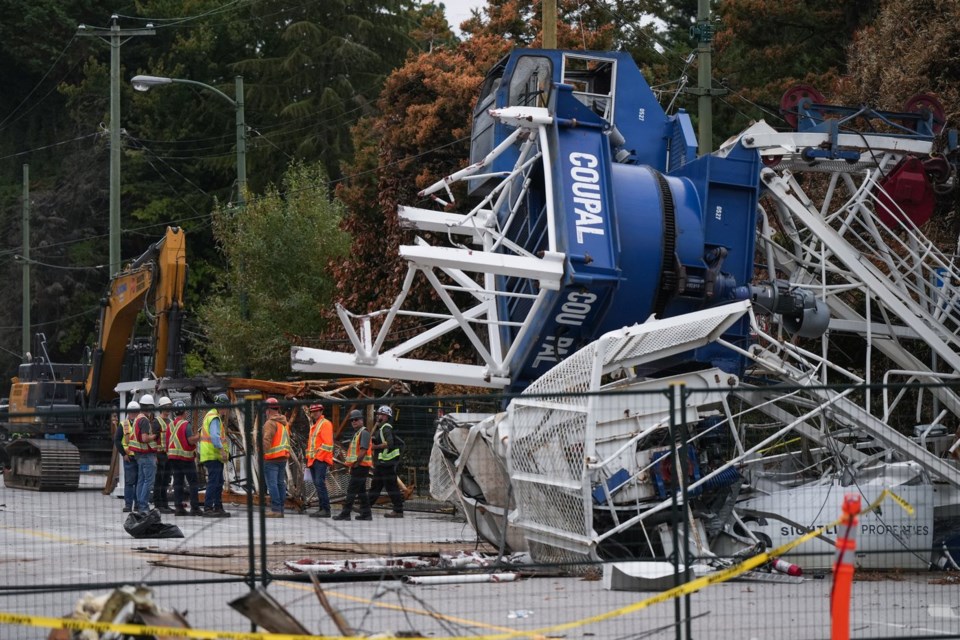VANCOUVER — Crews have begun removing a huge collapsed crane that has blocked a major Vancouver thoroughfare for more than two weeks, but officials say traffic on the street may not return to normal until the Labour Day weekend.
Vancouver chief building official Saul Schwebs said Wednesday he does not anticipate the dismantling and removal of the crane that collapsed across West 41st Avenue to stretch beyond Friday.
However, Schwebs said crews still need to repair all the infrastructure damaged on Aug. 6 when a fire at a construction site sent the crane crashing down, cleaving a nearby house in half in the process.
"There's about a four-cubic-metre divot in 41st Avenue that is going to need to be filled in by folks from engineering," Schwebs said at a press briefing on site Wednesday.
"Also, Coast Mountain Bus is going to have to come in to restore the trolley lines. I believe some of the internet cable providers have some work to do — hopefully they'll be able to do that work without further interruption in service, and then BC Hydro is also going to have to repair some of their infrastructure."
Schwebs said the aim is to "have everything wrapped up" by Labour Day — about 12 days away — in order to have bus routes running before students return to the nearby University of British Columbia.
WorkSafeBC, the province's worker safety agency, gave the green light for the crane-removal operation on Tuesday, and Schwebs said debris should be mostly cleared from the site by Thursday, although there may be further cleanup.
Schwebs said crews and investigators needed time to come up with a removal plan, given both the need to preserve evidence for the investigation into what went wrong and to ensure no further damage takes place.
"We know how to erect cranes and we know how to take them down," he said. "How to remove them off a street is a different matter … we're concerned about it shifting, we're concerned about it rolling over. We still have occupied houses next door."
The crane collapse happened during a fire in a six-storey building under construction in the Dunbar neighbourhood that spread and damaged nine homes.
Officials said three homes will have to be destroyed or are so heavily damaged that residents still cannot return.
Miranda Myles with Vancouver's emergency management agency says the city is still supporting 15 people displaced by the incident.
Myles said 81 people were originally displaced as a result of the fire and crane collapse.
Vancouver Fire Rescue Services deputy chief of operations Trevor Connelly said the investigation continues into the cause of the fire.
"What I can tell you is that the fire has been determined (as) accidental, but the exact cause at this point is undetermined," Connelly said.
"This building, in this stage of construction, there's a lot of tradespeople working in there, so there's a number of potential causes. But we have not been able to nail down the exact cause at this time."
Schwebs said the collapsed crane is being demolished and not salvaged, adding that the investigation will likely yield some regulatory changes to prevent similar accidents in the future.
"I think we're going to learn a lot of lessons from this incident," he said. "It's unfortunate that it occurred. I feel empathy for the folks that were involved or impacted … but on the good side, we're going to learn some positive lessons.
"We pay attention to these things, we learn from them, and they help us keep them from happening in the future."
This report by The Canadian Press was first published Aug. 21, 2024.
Chuck Chiang, The Canadian Press



